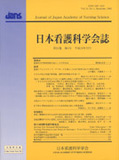Japanese
English
- 販売していません
- Abstract 文献概要
- 参考文献 Reference
- サイト内被引用 Cited by
要旨
本研究では,一般病棟に入院する末期がん患者の家族に対するケア提供の実態とその関連要因を明らかにすることを目的に,都内4総合病院の看護師を対象に,家族への4つのケア(①インフォームドコンセント,②患者へのケア教育,③死の受け止めに関するケア,④精神的ケア)の実施程度,学習経験などの看護師の個人要因,および病棟管理体制などの病棟のシステム要因について尋ねる無記名質問紙調査を,配布は対象機関ごと,回収は個別に行った.質問紙の回収をもって調査参加への同意とみなすことを明記し,367名(回収率72%)より回答が得られた.4つのケア実施程度はいずれも6~7割であり,重回帰分析により各ケアの実施程度と有意な関連が認められた要因は,①~③の患者の疾患に関連するケアは,研修会参加や手引書の活用といった均質化した集団教育が可能な学習経験であった.一方,④の家族への精神的ケアは,熟練看護師による個別のケア指導の経験が関連を示した.本研究により,末期患者を抱える家族へのケア提供に有用な要因として看護師教育があげられ,その方法はケアの特徴別に異なること,およびその具体策が示唆された.
Abstract
The objectives of this study were to examine the level of offering nursing cares for family members of terminal cancer patients and the related variables in general hospitals.We examined the related factors that focused on nurses'experiences and features of care units. Staff nurses in twenty-seven care units from four general hospitals in the Tokyo metropolitan area were asked to complete a questionnaire and return it by mail individually. Consent to participate was identified by return of the questionnaire by mail. The nurses answered the level of four types of offering care for family members of terminal cancer patients. The investigated care items were ① provision of information, ② educational support to deal with the patient's physical and psychological problems,③ death-related care, and ④ psychological support for family members. The levels of offering of each care items were 60-70%. The related variables of the level of each care items were analyzed using multiple regression analyses. The levels of disease-related cares of patients (①-③)were significantly correlated with the nurses'educational experiences such as attendance at large-sized educational sessions and self-learning with printed materials. On the other hand, psychological support for family members (④)was significantly correlated with the individual educational support from veteran nurses. The study showed that educational courses with large-sized sessions and printed materials are effective in enabling nurses to offer the patient disease-related care such as information provision and death-related care. The study also indicated that developing individual educational support systems is important for nurses to provide psychological care for families of terminal cancer patients.
Copyright © 2004, Japan Academy of Nursing Science. All rights reserved.


